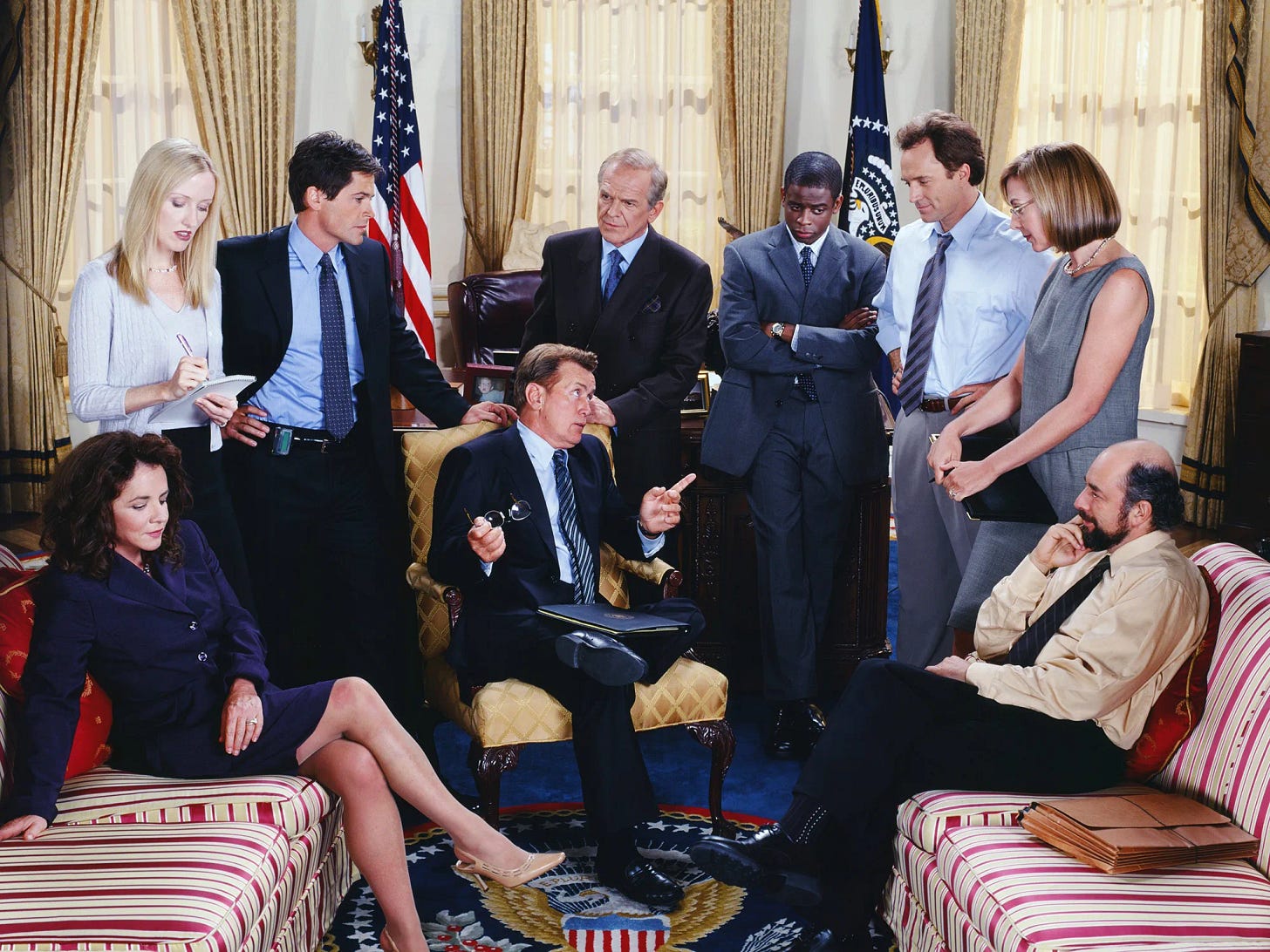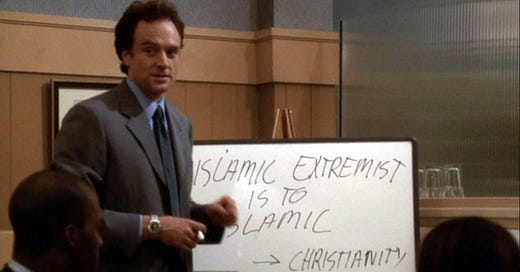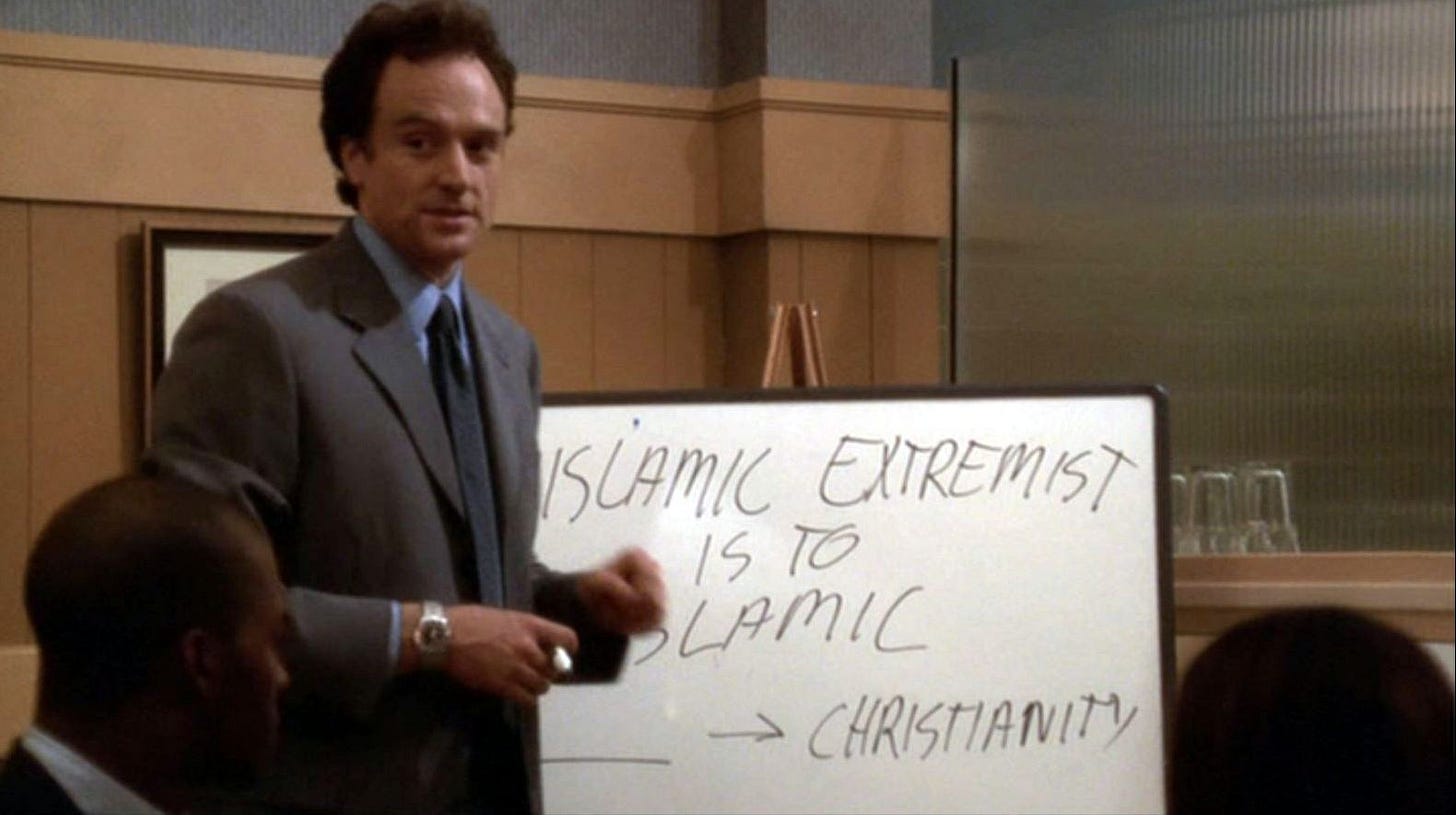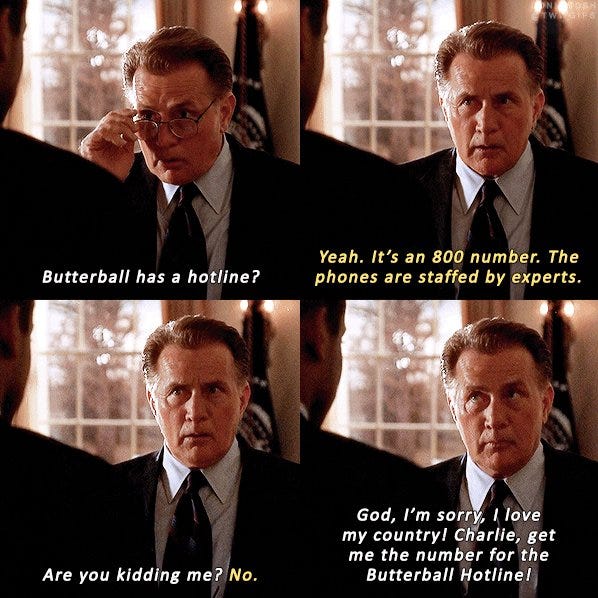The West Wing's 9/11 Bait and Switch
How Sorkin went from "Isaac and Ishmael" to "They'll like us when we win"
When two planes struck the World Trade Center on September 11, 2001 — a month before his hit television show The West Wing was set to premiere its third season — Aaron Sorkin had a choice to make. He could take this paradigm-shifting event that proved terrorism could hit American soil and merge it with the alternate universe he’d constructed, or he could ignore it and continue with his story as planned.
The West Wing premiered in 1999, long before Sorkin would go on to fetishize the Bloomberg Terminal and lecture us with Coldplay needle drops in The Newsroom. Riffing off of the Michael Douglas flick Sorkin had written a few years earlier The American President (or as I like to call it, the most unwatchable movie Annette Benning has ever made), the show followed a Democratic president, Martin Sheen’s Jed Bartlett, and his staff in the West Wing. It was perceived as a smart and witty antidote to the buffoonery of a looming Bush presidency: While Bartlett’s presidential staff could be arrogant and flippant, they were highly educated and ultimately driven by compassion and a patriotic duty to better their country.

Before the twin towers went down, The West Wing had left off on another slam dunk season finale, “Two Cathedrals,” one of the best episodes of the series in which Sheen calls God a “feckless thug,” puts out a cigarette on the floor of a cathedral and then proceeds to announce he is running for a second term.
At the time, I’m sure fans of The West Wing, (not speaking from experience here because at the time I was five chanting “I wish, I wish, with all my heart, to fly with dragons in a land apart” at my pet rock1) were wondering if 9/11 would make an appearance.
Traditionally, Sorkin wrote in fictional international conflict for President Bartlett to fret about in the Situation Room, but they were modeled after real life events and issues, so the possibility of season three opening with a devastating domestic terrorist crisis was there. And you might say, “Rachel, the guy only had a few weeks to bang something like that out in time for the season three premiere at the start of October!” Yes, but what we have to remember is Aaron Sorkin was doing so much cocaine and mushrooms in the early 2000s, he could have done it.
What we got instead was a very special episode: “Isaac and Ishmael.”
The episode pushed aside the drama that would later drive the new season — Bartlett’s bid for a second term while dealing with the fallout of hiding his MS diagnosis — in favor of imagining a world in which Bartlett’s guys were in charge of the country when the towers fell. The show never mentions 9/11, but it alludes to the situation as deputy chief of staff Josh Lyman (Bradley Whitford, now better known for his roles in Get Out and Handmaid’s Tale) gets stuck in a recently-very-common security lockdown with a class of high schoolers who earned a tour of the White House. One of the students asks Lyman, “why is everyone trying to kill you?” and it launches him into a philosophical discussion about the origins of terrorism and who exactly is trying to kill who these days. The whole gang gets involved: press secretary CJ Cregg (goddess Allison Janney), communications director Toby Ziegler (Richard Schiff) and deputy comms director Sam Seaborn (the perfectly cast Rob Lowe).
Sorkin’s White House staffers preach tolerance, or at least critical thinking, imploring these young people to direct their blame not at an entire religion or even a country but to look deeper at the things that divide us and the things that unite us, culminating in First Lady Abbey Bartlett (Stockard Channing of Grease and Practical Magic) pointing out that the fathers of all three monotheistic religions, Isaac and Ishmael, themselves shared a father, Abraham, and when he died they came together to bury him.
It was Sorkin to a T, merging the historical and the religious with the political troubles of today, tying it all in a neat bow just to say that nothing is neat. This is the man who at one point convinced me adding “and we reach for the stars” onto any presidential speech was revolutionary writing.
I watched this episode for the first time in 2016, as presidential candidate Donald Trump was proposing we build a wall to keep immigrants out, so Sorkin’s writing did feel kind of revolutionary. When, a year later, President Trump signed an Executive Order on a “Muslim ban” stopping foreign nationals from seven predominantly Muslim countries from visiting the U.S. for 90 days, I remember posting a clip of “Isaac and Ishmael” on my Facebook page, of Lyman telling students “the Taliban is to Islam as the KKK is to Christianity. That’s what we’re talking about. It's the Klan!”
But “Isaac and Ishmael” would go on to be a one off. Sorkin never actually incorporated 9/11 into the show, and he said later that it could have been its downfall.
He told The Hollywood Reporter, “Because our characters lived in a parallel universe, as opposed to the characters on Mad Men who live in historical fiction, our characters were the only ones not affected by 9/11, and that was a problem.”
But co-executive producer Kevin Falls said it wouldn’t have worked. He told the Hollywood Reporter “Everything we came up with just paled in comparison to what was happening in the world. ‘Isaac and Ishmael’ was an effort to be relevant as it pertained to 9/11, but I think doing that every episode would have been a mistake. So it became something that was there, that was the new world, but we never mentioned real historical figures during that time.”
But as Falls alluded to, that new world did seep into the show regardless. And it proved “Isaac and Ishmael” to be more than just a one-off, but a red herring or a bait-and-switch.
While “Isaac and Ishmael” said one thing about tolerance and being careful about attributing terrorism to entire swaths of people, Sorkin ultimately did another. The West Wing grew increasingly more neoliberal. And Muslim countries were almost always bearing the brunt of the White House’s vitriol.
In a disturbing speech that unfortunately was so well-delivered by Richard Schiff I still have parts of it memorized, Toby Ziegler wails on about how the country doesn’t have to “play nice” with “the Arab world.”
“Thousands of madrasas teaching children nothing, nothing, *nothing,* but the Quran, and to hate America. Who do we see about that?” Schiff said. “Why does the U.S. have to take every Arab country out for an ice cream cone? They'll like us when we win!”
I don’t have the energy or the credentials to get into everything wrong with Ziegler’s diatribe (the fact that this scene shows up on YouTube as “Arab Rant” speaks for itself), but objectively “they're coming for us now, so it's time to saddle up!” is margins away from Ziegler’s “Isaac and Ishmael” assertion that “Bad people can't be recognized on sight. There's no point in trying.” The show went from preaching pluralism to Zero Dark Thirty pretty damn fast.
The shift comes just a season apart as the show’s central plot pivots away from President Bartlett’s election woes and into an international conflict with fictional Middle Eastern country Qumar. The U.S. assassinates Abdul ibn Shareef, the Qumar defense minister, and buddies up with Israel. Season four ends with the president’s daughter Zoey Bartlett (a young Elizabeth Moss) being kidnapped by Qumari terrorists.
The Bartlett administration may not have been sending troops to Iraq under false pretenses, but judging from the direction Sorkin was taking his characters, if he had decided to write in a mass terror attack, they might not have hesitated to invade.
Like I said, Sorkin had a choice to make. But I see now that the choice wasn’t between ignoring 9/11 or writing it in, because there was no ignoring 9/11. The twin towers falling made a permanent indent in the culture in the same way the Red Scare or any of the World Wars or Watergate did, and just as COVID-19 will, along with the Oprah interview where she asked Megan Markle if she had been silent or silenced. His choice was less of a choice and more a goal post that he’d either meet or he wouldn’t. Would he follow through with his vision for The West Wing: a reimagination of what it would be like if good men were in office? How would we respond to a crisis like this if the people running the show were exceedingly smart, but also not bigoted, if they were good listeners who had big hearts and an unshakable loyalty and duty towards the people they served? Where would we be then?
Sorkin didn’t answer that question. Maybe because those men don’t exist in the way he was imagining them.
I’m projecting a little, because as my politics have shifted and I’ve become more jaded about political institutions in general, I’ve grown to see The West Wing in a different light. Now all I really enjoy about the show is the witty banter between co-workers and Sheen’s impeccable comedic timing in calling up the “Butterball Hotline” asking how to cook a turkey on Thanksgiving.
Rewatching “Isaac and Ishmael” this week, there was a lot I couldn’t stomach. A B plot of the episode involves Chief of Staff Leo McGarry caustically interrogating a Muslim staffer who intelligence officers suspect is an alias for a foreign terrorist group. It’s clear the show is trying to make McGarry look bad, as a teaching moment. He says to the staffer, whose only real offense was having a common name, “that’s the price you pay.” When the staffer says, “the price I pay for what?” Leo ignores him and moves onto more intrusive questions until the real alias is found and he’s cleared.
But even though Leo comes off looking bigoted, by the end of the episode, he’s still a member of Sorkin’s noble band of heroes. He goes back to the staffer’s office later in the day to give a weak half-apology, saying that most people who knew him would say he’s not normally so intolerant. He stopped just short of saying “I have Muslim friends!” In a tiny sliver of credit to Sorkin’s writing, the staffer doesn’t completely absolve Leo by forgiving him. He does what many would do in that situation and just smiles and nods until the boss walks away. But the last infantilizing thing Leo says turns my stomach: “Hey kid, way to still be at your desk.”
This is Sorkin’s definition of a good man. Perhaps, then, Arabs becoming The West Wing’s punching bag was a tragic inevitability.
The way that Sorkin and The West Wing producers talk now, they really make it seem like 9/11 was the nail in the show’s coffin. It was a case of reality undermining fiction in the same way the Trump presidency sank House of Cards and Scandal, and made Veep look like a documentary.
But I think Sorkin is wrong. 9/11 didn’t unravel his show; he did. 9/11 simply presented him with a challenge that proved his goal was too lofty and he wasn’t the man to execute it. As he would write it: his demons outweighed his angels.
B Plot
Question: Who is a character who was perfectly cast?
Mallika: He’s still top of mind, so I’ll go with Kieran Culkin as Roman Roy. I’m not sure who else could have acted so absolutely foul in the first episode (the baseball scene… you know the one) and then subsequently made Roman my favorite character. Yes, I know he continues to be foul but his delivery of lines like “What I think he meant to say was that he wished that Mom gave birth to a can opener, because at least then it would be useful” simply can’t be topped. His mix of panic and dejection when he accidentally sends his dad a dick pic? That’s what I call ~physical theater ~. It’s wild to think we could have had Jeremy Strong in this role (he auditioned for it before landing Kendall). They made the right call, but imagine the cast interviews complaining about Jeremy’s method acting if he had been embodying Roman at all times.
Rachel: This answer is boring because my brain is tired from trying to write about Aaron Sorkin and only getting in one dunk on The Newsroom but Daisy Edgar Jones and Paul Mescal were obviously the perfect choices to play Marianne and Connell in Normal People. I’ve been watching this outtake of the two of them on repeat and it’s making me SICK.
C Plot
The trailer for American Horror Story: Delicate dropped starring Emma Roberts, Kim Kardashian, Cara Delevingne and Matt Czuchry (yes Logan from Gilmore Girls, and also the resident in… The Resident, if anyone besides Mallika cared about that show). The monster this season appears to be motherhood and we WILL be tuning in. To every other show airing this fall, we say the same thing Emma said to that secret service agent who was just there to protect Bill Clinton while he bought some books: get out of the way.
In a true American crime story, That 70’s Show’s Danny Masterson has been sentenced to 30 years to life in prison for rape. Meanwhile Woody Allen is considering retirement and calling cancel culture “silly.” Is this what it means to live in the multiverse?
How I Met Your Father has been cancelled after two seasons, which means we’ll never find out how Kim Catrall met those kids’ daddy. And honestly, how dare they even ask? Is she not enough? That woman was being undervalued once again and she said I won’t stand for this!
Dragon Tales aired from 1999-2005, which begs the question: What did Cassie the pink dragon think about the Iraq War?





